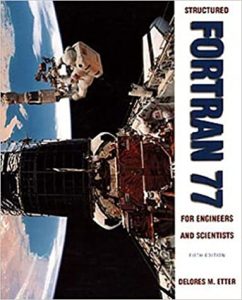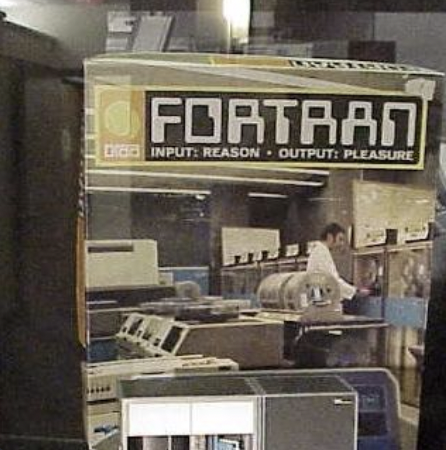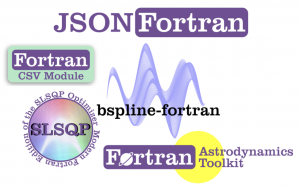The Prehistory of Fortran-Lang

At the recent FortranCon2021, I was amused to see in the presentation "The State of Fortran 2021" that the first bullet point on the slide "Formation of Fortran-Lang" was:
August 2019 Conversations on Twitter between Ondřej Čertík, Milan Curcic, and Jacob Williams bring out common perceived shortcomings in the Fortran ecosystem
Laurence Kedward, et. al., "The State of Fortran 2021", Fortran2021, Sept. 2021
So, now, over two years later, I think it's finally time to tell my side of the story. 😀
I was first introduced to Fortran 25 years ago, in 1997 (my only previous programming experience was with BASIC on Apple ]['s). We used the WATFOR FORTRAN 77 compiler on DOS machines in an undergraduate programming class for engineers. Little did I know (or little did the university know) that Fortran 90 had been published years earlier (and indeed Fortran 95 was published at the end of that very semester).
Over the course of my academic career, I encountered and used Fortran a few times, mostly FORTRAN 77, and mostly to solve homework problems or do class projects. I came to use IMSL, Numerical Recipes in FORTRAN 77, Harwell Subroutine Library, and had some minimal exposure to Fortran 90 one semester when asked to modernize some old code by one of the professors for some project that I've forgotten about (something to do with gravity anomalies). But mostly I used a lot of Matlab, which is very popular among engineering students (due to cheap student licenses). I also used a little MathCad, some Mathematica, REALBasic (since renamed Xojo), and Visual Basic (classic). There was then no exposure in the aerospace engineering curriculum of two major US universities to any sort of formal software development practices (for all I know this is still the case). I never once encountered version control, unit testing, continuous integration, etc. Maybe those weren't as common then? (Subversion didn't come out until 2000, and Git until 2005).

When I entered professional life in late 2006, it wasn't long before I became the lead developer of a Fortran tool at NASA called Copernicus. Originally created by one of my former professors, Copernicus is a tool for spacecraft trajectory optimization and design. While working on Copernicus, I was introduced to Fortran 90/95 in earnest. Copernicus was originally developed on Windows with Compaq Visual Fortran (which, by the time I came along, had recently become defunct) and one of my first projects was to convert the code over to use the Intel Fortran compiler (which we have used ever since). During this period I first became aware of modern-ish (Fortran 95) concepts such as user derived types, operator overloading, function overloading, etc. Eventually Fortran 2003 came along, which was quite a revelation, and as soon as non-buggy implementations of the new features appeared in the Intel compiler (it took a while) I was using it like crazy. It's hard to imagine programming Fortran now without modern features such as type bound procedures. FORTRAN 77 (and indeed, even Fortran 95), to me, now seems like something out of the dark ages. And so I came to really appreciate the Modern Fortran programming language, and wondered why more people didn't use it (or seem to even know about it).
![[from archive.org]](https://degenerateconic.com/uploads/2021/10/compaq.png)
The fact was, all was not well in the larger Fortran community. Really, there was very little community. Most of the code I encountered on the internet was still FORTRAN 77, like the last 25 years never happened. There were also few if any Fortran blogs (there were a few of exceptions: Fortran Dev [now defunct], Fortran in a C World [now also defunct], and Steve Lionel's Doctor Fortran column at Intel [still updated infrequently]). One of the bright spots was the Intel Fortran Compiler forum, which was always full of helpful folks (Steve, of course, the most helpful of all). There were very few websites to speak of that had much useful Modern Fortran content. Fortran.com is a mostly-useless site, and fortran.org has been held hostage by a domain name squatter for years. Ondřej Čertík's site fortran90.org is good (but of course it is folly to put the standard name in the URL since that will eventually be out of date). Fortranwiki.org, administrated by Jason Blevins is also a good site.

On June 26, 2014, I started this blog, with the intent to focus on modern Fortran and astrodynamics algorithms. Earlier that year, I had also discovered GitHub and started to work on some projects there as well. At work, we were still using Subversion for version control at this time, but I wanted to learn more about git. The blog and my presence on GitHub was an experiment to attempt to publicly develop an ecosystem of Modern Fortran libraries (either by creating new ones, or refactoring old codes that hadn't been updated in decades that nobody else seemed to want to update), as well as to advocate for Fortran and show what it could do. On GitHub I encountered others who were also working on Fortran tools, namely Stefano Zaghi (author of lots of great libraries and tools, including FoBiS, the Fortran Building System for poor people, which is very dear to my heart), Zaak Beekman (who helped me greatly with JSON-Fortran and introduced me to continuous integration), Chris MacMackin (author of the ford automatic documentation generator for Fortran, which I contributed a very very small amount to), and a few others. Zaak also started a GitHub group called the Fortran F/OSS Programmers Group, which I also participated in and view as sort of a precursor to the fortran-lang group. Zaak and I coauthored a paper in 2018 on Modern Fortran applications in my field of spacecraft trajectory optimization, which I consider to be my magnum opus.

In April 2017, I was approached by Manning Publications, who wanted to discuss the possibility of writing a Fortran book. I didn't really have time to do that so I declined. But luckily, they also approached Milan Curcic, who did end up writing it (Modern Fortran, 2020) and it turned out excellent.

I currently have 67 repositories on GitHub, the vast majority of them being Fortran libraries, and they are used by lots of people all over the world in various fields of science and engineering. But one thing I didn't really have the aptitude or know-how to do was to form an online community. Years ago I considered buying the fortran.io domain when I noticed it was still up for grabs, but it was eventually bought by Nick Doiron around 2016 (see FORTRAN.io -- finally, a Fortran Web Framework) which made the rounds somewhat on the tech internet, basically just as a novelty. I guess the .io fad for tech domain names is over now anyway?

There just wasn't a website that really served as a focal point for the entire Fortran community. It was a huge image problem. This was one of the things I lamented in my (infamous?) August 2019 post. Luckily, Milan had purchased fortran-lang.org sometime in 2018, and that is what he activated for the new site in April 2020. Milan and Ondřej have already written about their amazing efforts to rejuvenate the Fortran community and ecosystem (I first became aware of Ondřej in April 2019 when he announced LFortran, which totally blew my mind). The fortran-lang website, the Fortran Standard Library, the Fortran Package Manager, and everything else that has come out these activities has been spectacular. I have actually contributed very little to all of this, although I did help with the logo (see this previous post for the story on that). I also continue to toil away on my libraries like before (recently getting a good number of them set up to compile with the new Fortran Package Manager).
So, now you know my side of the story. The future of Fortran is looking bright, and I'm pleased to have contributed in some small way. Now get off my lawn.
See also
- J. Williams, R. D. Falck, and I. B. Beekman, "Application of Modern Fortran to Spacecraft Trajectory Design and Optimization", 2018 Space Flight Mechanics Meeting, 8–12 January 2018, AIAA 2018-145.
- J. Williams, End of Life [degenerateconic.com] August 3, 2019
- J. Williams, New Blood [degenerateconic.com] April 26, 2020
- M. Curcic, First year of Fortran-lang [medium.com] Dec 21, 2020
- O. Čertík, Resurrecting Fortran [ondrejcertik.com] March 12, 2021